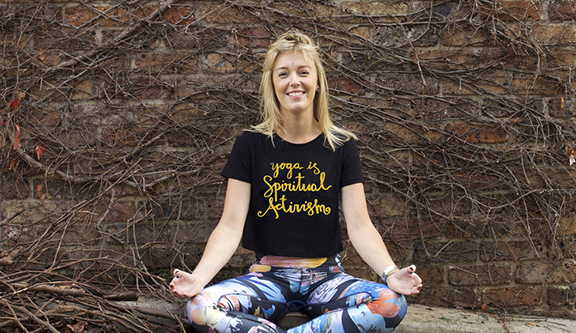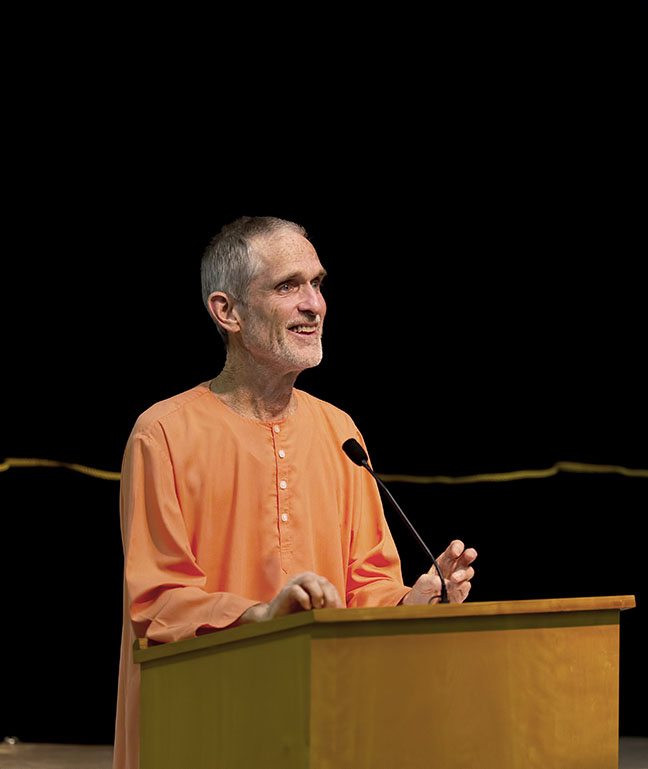 At a satsang in New York some years ago, I raised the question, “What matters most to you?” I spoke about the importance of clarifying what we value and reflecting on the ultimate purpose of our lives. Speaking to a group of yogis, I was not surprised that someone suggested right away that moksha or spiritual liberation was most important.
At a satsang in New York some years ago, I raised the question, “What matters most to you?” I spoke about the importance of clarifying what we value and reflecting on the ultimate purpose of our lives. Speaking to a group of yogis, I was not surprised that someone suggested right away that moksha or spiritual liberation was most important.
We all might understand liberation, or Self-realization, to be the goal of Yoga, but what does that really mean to us? It remains a vague and distant idea that may have little relevance to our daily lives. How do we actually go about pursuing enlightenment?
We often think of realization as something passive that happens by stilling the mind, as the Yoga Sutras imply. But it is better understood as an active response to life, as a way of bringing to life or embodying the qualities we associate with our spiritual nature: compassion, peace, joy, etc. True awakening is not something that happens in isolation; it blossoms—a fruit of both our Yoga practice and our conscious choices in relationship to each other and our environment.
Imagine how it would feel for our essence-nature to be as tangible and active as the body and mind while pursuing our goals. Every time we are fully present to life and act with mindfulness, we take a step toward this reality. Our true nature is expressed each time we recognize with gratitude all the ways we are blessed, and allow that sense of abundance to overflow as generosity with others.
Pausing and breathing to allow a sense of peace to arise in a quiet moment is a beautiful step toward liberation. Bringing more compassion into an interaction in line at the store or in heavy traffic is a genuine stride in spiritual growth. Taking the time to be fully present and experience the joy of playing with children or listening deeply to a friend who needs to talk are enlightened choices. These are examples of how spiritual realization is pursued in each moment that we act while holding in our hearts a clear vision of what matters most to us.
The late Yoga teacher and author Michael Stone powerfully articulates the importance of bearing witness to the world we live in with all its injustice, suffering and corruption, as well as its magic and majesty. He describes in detail how spiritual life includes taking responsibility for our participation as a member of this planet. In his book, Yoga for a World out of Balance, he writes, “It’s hard to wrap our minds around the way transportation patterns, digestion patterns, pollution, consumption, even the dinner table itself, impact the web we call life. Without attention to such connections, choices become life-destroying rather than life-affirming.”
I believe our spiritual practice is much more potent when seen in the context of the condition of our world, our communities and our homes. Everyday choices, as well as our long term goals, take on new relevance when we realize that each action and every focused thought is a tangible contribution to the collective consciousness of our planet. Our science-oriented culture does not appreciate the power of the subtle energies we generate in our hearts and minds. Yet how many times has a gesture of generosity had a ripple effect that touched many hearts? How many prayers for healing have brought soothing relief to someone who is suffering?
Each time we disengage ourselves from the grip of habitual ego-driven thought, we bring a greater awareness into presence. Sri Swami Satchidananda strongly affirmed that each time we pray for peace in the world, as we do at the end of each class, we send potent energies out into our world. Even though we may not see the effect, each instance of mindfulness, every act of kindness, is a significant act in co-creating reality.
On a larger scale, we are systematically destroying our home, Mother Earth, and our response to this crisis is a crucial element of spiritual life. Thus, spiritual practice can also include promoting green energy, conserving water, and taking concrete steps to withdraw our support of the wasteful culture of consumption we live in, as well as the mass production of harmful chemicals that pollute our environment.
We might feel that the full experience of enlightenment is far away from us, but we experience a taste of it when we serve, love and give. It is our nature to give in response to all we receive. Sri Swamiji articulates this beautifully in his book, The Golden Present:
“If you think in terms of how much benefit we get just by being here on the surface of the earth, how much we get from nature, how much we get from people, how much we get from association, we receive constantly. Even the smile from a baby is a gift. You don’t have to give it back at the same place if you get a smile from a baby, do something to help a poor person somewhere on the road, or a sick person—somebody who needs a little help. That will balance it out.”
When we sincerely reflect on all that we have been given, we cannot help but feel abundance. We can reflect further on how the United States and other western countries have taken advantage of less powerful countries, and how this dominance has contributed to the imbalance of wealth and justice in the world. In a magazine article I read, the Buddhist teacher Thich Nhat Hahn wrote, “The pain of one part of humankind is the pain of the whole of humankind. We have to see that and wake up.”
Those of us who live with material security and abundance easily take those things for granted. I feel we have an obligation to serve those less fortunate in any way that we can. We may not be able to negotiate peace settlements or end world hunger, but we can each take concrete steps to volunteer our time right where we are. We can offer free Yoga classes, serve in a soup kitchen, tutor underserved children, or reach out in myriad ways to those in need.
Serving in these ways is a natural expression of gratitude and arises from the recognition of our interdependence with all of life. Actions performed with genuine care for others are healing for our hearts, and we find joy in giving rather than looking for a reward or outcome. This is how we really bring our Yoga practice to life.
Every choice we make, everything we do, can be guided by either a ‘me’-centered or ‘we’-centered mindset. Understanding how our daily actions are the moment to moment expression of what matters most to us can transform our lives, bringing meaning to every aspect of it. May we all learn to see how awakening to our own inner Light is actually the same as manifesting that Light into our world.
About the Author:


